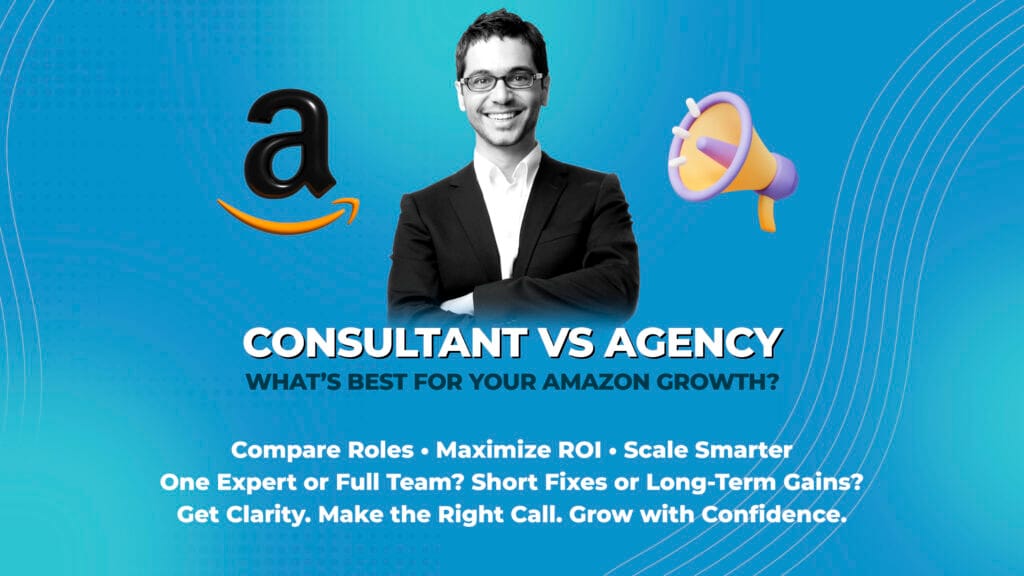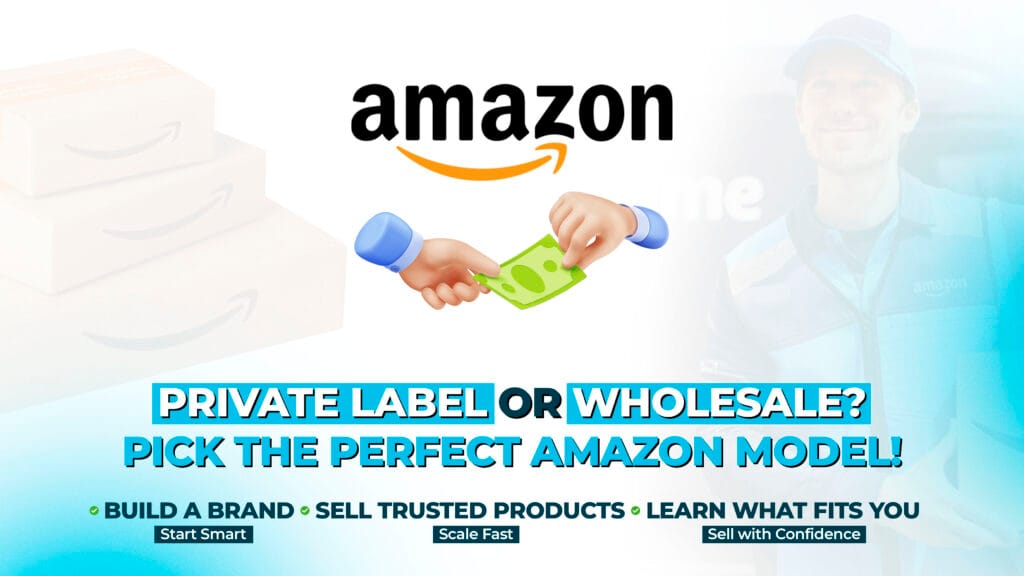Amazon Consultant vs Amazon Agency: Which Is Better?

Are you an Amazon seller eager to scale your business, enhance your listings, or bounce back from account issues? You might ask, “Do I need an Amazon consultant or an Amazon agency?” While both can offer valuable support, the best option truly hinges on your unique business goals, budget, and desired level of control over your brand. This article will break down the differences, highlight the pros and cons, and guide you in determining the right choice for your current stage. By the end, you’ll gain the clarity and confidence needed to propel your business forward! The Growing Complexity of Selling on Amazon Amazon has evolved from a simple product marketplace to a complex ecosystem. Today, success requires: While an Amazon seller consultant can help with some of these tasks, many sellers find it overwhelming to juggle them all, especially as their business grows. This is where a dedicated Amazon agency can step in as a full-stack growth partner. Understanding the Roles: Amazon Consultant vs Amazon Agency An Amazon seller consultant is typically a solo expert who offers focused services, usually on a project or hourly basis. They’re ideal for quick fixes or guidance in a specific area, like listing optimization, advertising audits, or account reinstatement. In contrast, an Amazon agency operates as a team-based solution offering comprehensive, ongoing services. Agencies cover everything from creative design to PPC, inventory planning, customer service integration, and even marketplace expansion. The difference isn’t just in team size, it’s in the approach and scalability. Why Amazon Agency is Becoming the Go-To for Serious Sellers While consultants are incredibly helpful for short-term needs, agencies offer a level of support that most sellers can’t replicate in-house, especially if they’re growing fast or operating multiple SKUs. Here is what a user on Reddit had to say: 1. All-in-One Execution One of the biggest advantages of working with an Amazon agency is access to a centralized team. Instead of managing multiple freelancers or trying to be a copywriter, marketer, and strategist yourself, an agency streamlines it all. You’ll typically get: This holistic approach creates consistency and efficiency across every aspect of your store. 2. Scalability Without the Overhead Let’s say your business doubles in revenue within six months. Can your current setup handle that? Amazon agencies are structured to grow with you. They can onboard new products, ramp up ad budgets, and expand into international markets without slowing down. With a consultant, growth may require hiring more specialists or spending more time managing tasks yourself. Agencies, on the other hand, already have the systems and talent in place. 3. Team of Specialists vs. One Pair of Hands A solo Amazon seller consultant might be great at PPC or SEO, but probably not both, and certainly not photography, design, and logistics. Agencies assign each component of your business to a domain expert. This means a dedicated campaign manager handles your PPC, actual graphic artists design your creatives, and a strategist reviews your reporting. Each expert focuses on doing one thing extremely well, and your brand benefits from this depth. When an Amazon Seller Consultant Might Be the Better Fit That said, not every seller needs an agency right away. If you’re just starting or only need help with a specific issue, like a listing not indexing or a suppressed ASIN, a consultant might be the more cost-effective choice. A few scenarios where hiring an Amazon seller consultant makes more sense: Consultants are also great if you want to remain hands-on with your store but just need guidance in specific areas. Costs: Investment vs Return Some sellers hesitate to work with agencies due to higher retainers. But it’s important to view this as an investment, not just a cost. A quality agency doesn’t just maintain your Amazon business; it helps it grow. That could mean: With a consultant, your return might be more limited unless you’re highly involved in executing the advice yourself. Long-Term Growth Requires Long-Term Support Growing on Amazon isn’t just about solving problems; it’s about building a system that consistently drives profit and brand equity. Agencies are structured to offer this level of support. They don’t just fix issues; they prevent them. They don’t just optimize listings; they craft a brand story. And they don’t just run ads; they build scalable sales funnels inside Amazon’s ecosystem. That kind of long-term thinking is hard to get from one consultant working part-time on your account. Choosing the Right Partner for Where You Are Both Amazon seller consultants and agencies have their place in the ecosystem. The right choice depends on your goals, stage of growth, and level of involvement. If you’re just starting or need short-term help, a consultant might be a perfect fit. But if you’re ready to scale, automate, and dominate, then partnering with a seasoned Amazon agency could be the smartest move you make this year. Take Action Today: Choose the best Amazon Agency. At Brand Aventus, we help sellers transition from scattered operations to streamlined growth. Our team of Amazon specialists handles every part of your journey, from listing optimization and ad management to brand strategy and analytics. Book a free strategy call today to find out how we can help your Amazon business grow faster and smarter.
The Best Amazon Selling Model: Private Label vs. Wholesale

If you want to sell on Amazon but don’t know where to start, don’t worry, you’re not alone. Many people ask the same question: “What is the best Amazon selling model?” Should you sell your own brand (called private label)? Or should you buy products from a brand and sell them (called wholesale)? According to a survey, 54% of Amazon sellers use the private label business model for their own brand and product line, while wholesale lags behind at 26%. In this blog, we’ll help you pick the best Amazon selling model for YOU. What Is the Best Amazon Selling Model? Before we can choose the best one, we need to understand what each model means. Private Label: Build Your Own Brand Private label means selling products under your own brand name. You find a product, usually from a factory, put your logo on it, and sell it on Amazon as if it were your creation. Many famous Amazon sellers use this method because it lets them build something unique. For example, imagine you sell water bottles. Instead of selling any brand, you design your label, create a fun name, and sell it as a new product. It’s still a water bottle, but now it’s your water bottle. This method gives you more control. You decide the product name, price, design, and how it’s shown on Amazon. However, it takes more time and money to get started. You’ll also need to market your product so people find and trust your brand. Wholesale: Sell Well-Known Brands Wholesale means you buy products in bulk from existing brands and resell them on Amazon. These are brands people already know and trust, like Crayola, LEGO, or Dove. You’re not creating anything new; you’re just helping those products reach more buyers. Let’s say you buy 100 boxes of Crayola markers at a discount and sell them one by one on Amazon. Because people already know the brand, they’re more likely to buy quickly. This method is faster to start and usually costs less upfront, but the competition can be tough. Since you’re not the only one selling that product, other sellers might lower their prices to win the sale. You may also have less control over how your product listing looks or what price it sells for. Comparing Private Label and Wholesale: Which Is the Best Amazon Model? So, which one is right for you? Let’s compare them in a simple way: Private Label is great if you want to build your own brand and make bigger profits in the long run. You get full control, and your product stands out from the rest. But it does take more time and money to get started. Wholesale is good if you want to start quickly and don’t mind selling products that already exist. It’s easier to jump in and start making sales, but your profit might be lower, and there’s more competition. Both can work well, and it just depends on what fits you best. How to Choose the Best Amazon Selling Model for You Choosing the right model depends on your goals, your budget, and your style. Here are a few simple things to think about: First, ask yourself how much time and money you want to invest. If you have savings and can wait a few months to build your brand, private label might be a better choice. But if you want to start selling fast and see results quickly, wholesale is easier. Next, think about what excites you. If you like design, branding, and coming up with new ideas, private label gives you more freedom. If you’re more focused on numbers and flipping products quickly, wholesale might feel like a better fit. Finally, consider your long-term goal. Private label sellers often create brands that they can grow and maybe even sell one day. Wholesale sellers usually keep working to find good deals and restock products that are already popular. Starting Out: Best Model for Beginners If you’re just starting, wholesale might be the easiest way to learn how Amazon works. You’ll learn about shipping, pricing, managing inventory, and customer service without the pressure of building a brand from scratch. However, if you’ve sold products before or have some marketing experience, starting with private label can help you build something that’s truly yours. Many Amazon sellers begin with wholesale, then switch to private label once they feel more confident. Succeeding with the Best Amazon Selling Model No matter which model you choose, success on Amazon comes from doing the basics well. Learn Amazon’s rules carefully so your account stays safe. Choose products that people are already searching for. Use clear titles, helpful descriptions, and great photos so your product looks professional. And always take care of your customers, fast replies, quick shipping, and a friendly tone go a long way. Reviews also matter a lot. Happy customers leave good reviews, and good reviews help you get more sales. Be honest, helpful, and do your best every time. What Really Is the Best Amazon Selling Model? The truth is, the best Amazon selling model depends on YOU. If you want full control and creative freedom and are ready to invest more time and money, go with a private label. If you want a quicker start, lower risk, and easier entry, choose wholesale. There’s no one-size-fits-all answer. Both models work, and many sellers even do both. Ready to Choose the Best Model? Let Brand Aventus Help You Still unsure which model is right for you? You don’t have to figure it out on your own. At Brand Aventus, we help Amazon sellers like you launch, grow, and scale their business, whether you’re starting with private label or wholesale. Our team of experts can guide you through every step: from choosing the right products and creating powerful listings to navigating Amazon’s tricky rules and avoiding account issues. Get faster results. Avoid costly mistakes. Build a real, profitable Amazon business. Let’s turn your Amazon goals into real income.


